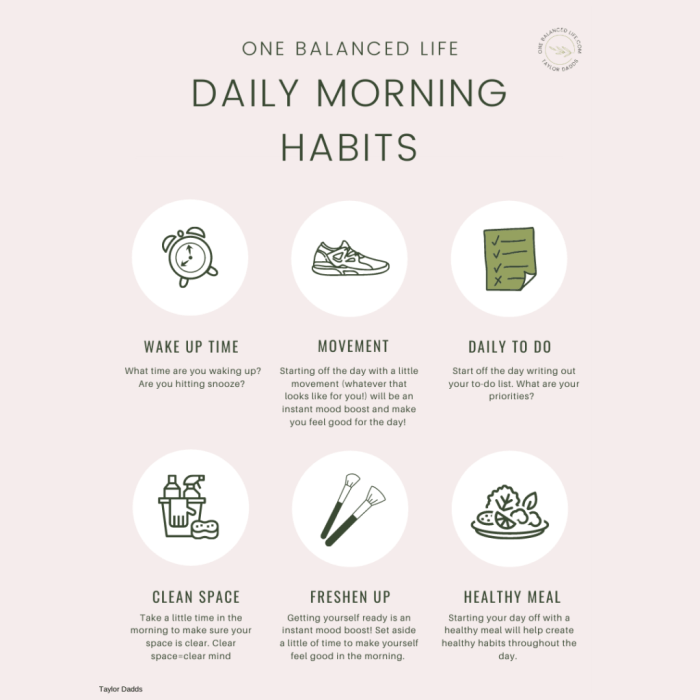Building Healthy Habits is all about making positive changes that impact your life in a major way. From boosting your energy to improving your overall well-being, this journey is one you don’t want to miss.
Get ready to dive into the world of healthy habits and discover the keys to unlocking a healthier, happier you.
Benefits of Building Healthy Habits
Developing healthy habits is crucial for maintaining overall well-being. These habits can positively impact various aspects of one’s life, leading to physical, mental, and emotional benefits. By incorporating healthy practices into daily routines, individuals can enjoy a higher quality of life and reduce the risk of chronic diseases.
Improved Physical Health
- Regular exercise and a balanced diet can help maintain a healthy weight and reduce the risk of obesity-related conditions such as heart disease, diabetes, and hypertension.
- Getting an adequate amount of sleep each night can boost immunity, improve concentration, and enhance physical performance.
Enhanced Mental Well-being
- Practicing mindfulness and stress-reducing activities like yoga or meditation can lower anxiety levels and promote mental clarity.
- Engaging in hobbies and activities that bring joy can increase overall happiness and reduce feelings of depression.
Long-Term Benefits
- Building healthy habits early in life can establish a strong foundation for continued well-being as one ages.
- Reducing the risk of chronic diseases through healthy lifestyle choices can lead to a longer lifespan and improved quality of life in the later years.
Strategies for Building Healthy Habits

Starting and sticking to healthy habits can be challenging, but with the right strategies, it is definitely achievable. It is important to find what works best for you and to be consistent in your efforts.
Gradual Changes vs. Drastic Ones
When it comes to building healthy habits, some people prefer making gradual changes while others opt for drastic ones. Gradual changes involve slowly incorporating healthier habits into your routine over time. This approach allows for sustainable lifestyle changes and prevents overwhelming yourself. On the other hand, drastic changes involve making significant changes all at once. While this can lead to quick results, it may be harder to maintain in the long run.
Ultimately, the best approach depends on your personal preferences and lifestyle.
Personalized Plan for Adopting Healthier Habits
To design a personalized plan for adopting healthier habits, start by identifying areas in your life where you want to make improvements. Set specific and achievable goals, such as exercising for 30 minutes each day or eating more fruits and vegetables. Create a schedule or routine that works for you, whether it’s working out in the morning or meal prepping on Sundays.
Find an accountability partner or support system to help you stay on track. Remember to be patient with yourself and celebrate small victories along the way. By customizing your plan to fit your needs and preferences, you’ll be more likely to succeed in building and maintaining healthy habits.
Common Challenges in Building Healthy Habits
Establishing healthy habits can be a challenging journey for many individuals, as they often face various obstacles along the way. These challenges can hinder progress and make it difficult to maintain a consistent routine. However, with the right strategies and mindset, it is possible to overcome setbacks and stay motivated on the path to building healthy habits.
Lack of Time Management
One common challenge in building healthy habits is the lack of time management. Many people struggle to find the time to exercise, prepare healthy meals, or practice self-care amidst their busy schedules. This can lead to inconsistent habits and difficulty in staying on track.
- Set specific time blocks for exercise and meal preparation in your daily schedule.
- Prioritize tasks and eliminate time-wasting activities to create more time for healthy habits.
- Utilize technology tools like apps or alarms to remind you of your healthy habits routine.
Social Influences and Peer Pressure
Social influences and peer pressure can also pose a challenge when trying to build healthy habits. Negative influences from friends, family, or coworkers can make it hard to stick to your goals and lead to unhealthy choices.
- Communicate your goals with supportive friends and family members who can encourage and motivate you.
- Avoid environments or situations that may tempt you to stray from your healthy habits.
- Seek out like-minded individuals or join a supportive community to stay accountable and inspired.
Lack of Self-Discipline and Motivation, Building Healthy Habits
Another common challenge is the lack of self-discipline and motivation, which can cause individuals to give up on their healthy habits journey. Without a strong sense of commitment and determination, it can be challenging to stay consistent and overcome obstacles.
- Set realistic goals and track your progress to stay motivated and focused on your long-term objectives.
- Reward yourself for small achievements and milestones along the way to maintain your enthusiasm.
- Practice positive self-talk and visualization techniques to boost your confidence and belief in your ability to succeed.
Impact of Healthy Habits on Physical Health: Building Healthy Habits

Healthy habits play a crucial role in maintaining overall physical well-being. They contribute to reducing the risk of various diseases and help in promoting a healthier lifestyle.
Role of Exercise
Regular physical activity, such as exercise, is essential for good physical health. It helps in improving cardiovascular health, strengthening muscles, and enhancing overall fitness levels. Exercise also plays a key role in maintaining a healthy weight and reducing the risk of chronic conditions like heart disease, diabetes, and obesity.
Role of Nutrition
Eating a balanced diet rich in nutrients is vital for supporting good physical health. Proper nutrition provides the body with essential vitamins, minerals, and energy needed to function effectively. A diet high in fruits, vegetables, whole grains, and lean proteins can help in preventing nutritional deficiencies and promoting overall well-being.
Role of Sleep
Adequate sleep is crucial for physical health as it allows the body to rest, repair, and recharge. Lack of sleep can lead to various health issues, including weakened immune system, cognitive impairment, and increased risk of chronic diseases like obesity and diabetes. Prioritizing quality sleep is essential for maintaining optimal physical health.



